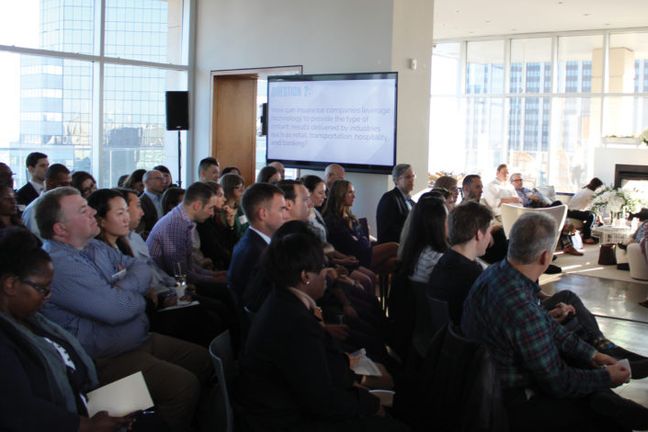 On Wednesday, October 18, Tyson & Mendes held its second annual Young Professionals Panel at the Andaz Wall Street rooftop to discuss the topic “Blame it on the Millennials: Gen Y’s Role in the Evolving Insurance Industry.”
On Wednesday, October 18, Tyson & Mendes held its second annual Young Professionals Panel at the Andaz Wall Street rooftop to discuss the topic “Blame it on the Millennials: Gen Y’s Role in the Evolving Insurance Industry.”
The insurance industry faces the dilemma: employees of the Baby Boomer generation are projected to retire at a much higher rate than employees of the Millennial generation are entering the industry. Some blame this problem on Millennials’ perception insurance companies are stiff, bureaucratic institutions who do not value their employees the way companies are thought to do in other industries.
The Young Professionals Event aimed to create a dialogue around these issues and provide insurance professionals with ideas and tips to help them create an environment more attractive to the younger generations. Panelists Claire Eagan, Lead Northeast Insurance Litigation Counsel at Uber; Daniel Glass, Claims Analyst at Argo Pro; and Elizabeth Homicki, Professional Liability Claims Specialist at Zurich North America shared their insights and experiences as young leaders in the industry, including practices they find useful and potential areas of improvement. Cayce Greiner, Partner of Client Relations, posed thought-provoking questions to the panel as moderator.
To kick off the conversation, the panelists addressed a question concerning the importance of a sense of meaning in a Millennial’s work. While Millennials are often characterized in mainstream culture as self-absorbed, entitled, and lazy, research shows the number one priority Millennials assign to their careers is a sense of meaning.
Mr. Glass opined insurance companies have a promising opportunity for innovation with a Millennial workforce, because this generation tends to welcome change. In addition, because Millennials came of age in a time of great economic loss, their personal fulfillment is less likely to be measured by financial success or ownership. Some view this as laziness or a lack of motivation. However, the panel provided anecdotes to suggest it simply indicates a changing set of values.
Next, the topic shifted to how technological innovation relates to a company’s success rate in recruiting and retaining Millennial talent. Millennials have a thinning patience for legacy technology and constantly look for ways to innovate. Conversely, insurance companies have a reputation for using clunky, obsolete technology both internally and with consumers. Ms. Eagan led this portion with examples of how Uber’s advanced technology has allowed her team to do more with less. In the fast-paced, high-stakes environment of claims handling, efficiency matters. Keeping the technology up-to-date is necessary to empower employees to be the best possible employees they can be.
Technological advancement also means increased flexibility. Ms. Eagan argued employees who are able to work from home may be are more productive than those without the option.
Lastly, the panel discussed how training programs can be reformed to increase retention rates beyond the current 3-year average. Ms. Homicki suggested an individualized approach to training demonstrates an employer’s level of commitment to its employees’ professional growth. Recalling how Millennials value a sense of meaning, Ms. Homicki mentioned an individualized, comprehensive training program can communicate a greater sense of meaning to an employee than an institutional, cookie-cutter approach.
The panel concluded with insightful audience questions and a beautiful sunset on the rooftop patio. Tyson & Mendes would like to thank our fantastic panelists and everyone who participated.
To learn more about Tyson & Mendes’ Young Professionals group, click here.

 Cannabis Workers Allege Quota to Trim 4 Pounds a Day Violates the California Labor Code
Cannabis Workers Allege Quota to Trim 4 Pounds a Day Violates the California Labor Code
 The Ninth Circuit Reminds Us: Every Word Matters
The Ninth Circuit Reminds Us: Every Word Matters
 NO WAY, PRO SE! The Consequences of Abusing the Judicial System as a Pro Se Litigant in Colorado
NO WAY, PRO SE! The Consequences of Abusing the Judicial System as a Pro Se Litigant in Colorado
 Victim of Financial Mismanagement or Unlawful Retaliation? New Jersey City University Program Founder Claims School Retaliated After Reporting Alleged Sexual Harassment
Victim of Financial Mismanagement or Unlawful Retaliation? New Jersey City University Program Founder Claims School Retaliated After Reporting Alleged Sexual Harassment
 “Real Housewives” Gets a Reality Check
“Real Housewives” Gets a Reality Check
 Missing a Chapter: Insufficiency of Expert Deposition Testimony in Medical Malpractice Litigation
Missing a Chapter: Insufficiency of Expert Deposition Testimony in Medical Malpractice Litigation
 Crash Course: Why Summary Judgment Misses the Mark in Illinois Multi-Cause Limousine Crash Collision
Crash Course: Why Summary Judgment Misses the Mark in Illinois Multi-Cause Limousine Crash Collision
 Bitter Truths: Lead, Cadmium, and Defective Pleadings in California Chocolate Class Action
Bitter Truths: Lead, Cadmium, and Defective Pleadings in California Chocolate Class Action
 The Law of Unintended Consequences: Including Insurance Brokers in Litigation Strategy Communication May Waive the Attorney-Client Privilege
The Law of Unintended Consequences: Including Insurance Brokers in Litigation Strategy Communication May Waive the Attorney-Client Privilege